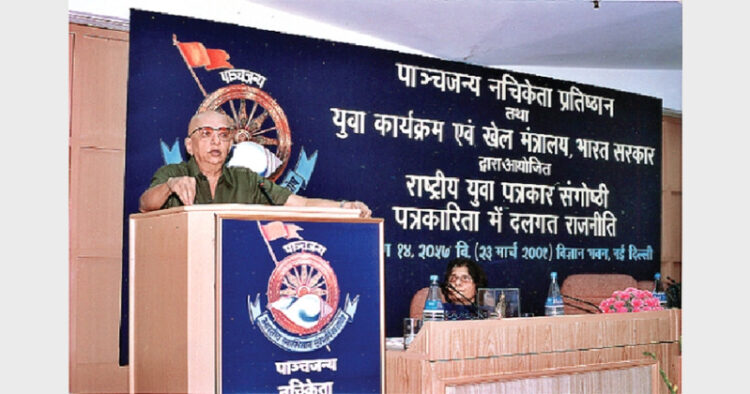Former Organiser Editor remembers Cho as an extraordinary versatile genius, a bold and incorrigible critic and a fiery journalist
Seshadri Chari
It is probably rarest of rare coincidence that a political personality’s trusted advisor follows him or her into the other world hours after the former’s last journey. Cho Ramaswamy, the versatile personality and founder editor of Tamil satire journal “Thuglak” was one of the longer lasting advisors to the former Chief Minister of Tamil Nadu J Jayalalithaa, who passed away just a day and a half before Cho died after prolonged illness.
Survived by his wife Soundra Ramaswamy, son Sriram, daughter Sindhu and a huge fan following of admirers, Cho Ramaswamy, 82, died due to cardiac arrest at 4:30 AM on December 7, at Apollo Hospital in Chennai where he was receiving treatment for respiratory problems. Ironically his friend from silver screen to politics Jayalaithaa (Ammu, as he knew her) was also in the same hospital but both of them could not meet due to health reasons. Cho reportedly was restless while watching the funeral of Jayalalithaa on television.
A unique feature of Tamil Nadu politics is the immense contribution of the silver screen to the political life of the state. Karunanidhi of the DMK was a script writer, MGR and Jayalalithaa were actors and their worst critic Cho Ramaswamy was part of the same celluloid world. Cho acted in as many as 190 films, practised as an advocate, became a dramatist but excelled in what he was probably born for—start a satire magazine “Thuglak”—in 1970. A bold and incorrigible critic, he had the knack of inflicting sharp criticism without offending and could laugh at his own faults too. It was no surprise that he was one of the prime targets of censorship during Emergency. Though Thuglak was not banned, unlike Organiser and The Motherland and some other journals, it was subject to strict censorship. Yet Cho could manage to publish articles and passages full of criticism camouflaged in innocuous looking words laced with double meanings.
Emergency brought Cho closer to the then anti-Congress leaders especially those in the Jan Sangh. After the fall of the then Janata government ostensibly on the issue of dual membership, Cho came closer to the RSS. He prevailed upon the then RSS leadership to reach out to the people through public debates and discussions. The result was phenomenal. RSS was able to attract a vast majority of the people and draft their strength towards hundreds of social welfare projects.
After 1980 when the BJP was formed he had great hopes and also met BJP leaders frequently. In one meeting in Mumbai RSS office I asked him to join the BJP. In his
characteristic humour he said, “Any party I join will lose the election”. Then he went on to explain the need for nationalist minded people from all walks of life to remain outside politics and enrich public discourse and strengthen democratic traditions. Truly, a visionary.
Cho truly believed that Hinduism should be reinterpreted to reach the present generation but propagated in a modern idiom. He began writing about it in his journal and questioned the illogical and politically motivated criticism by the Dravidian parties. In fact in the seventies it was a regular practice of the Dravida Kazagam (DK) to take out processions of Hindu deities garlanded with slippers and shoes. Cho published these photographs defying a ban and managed to sneak out thousands of copies before that issue of Thuglak was impounded. But that was the last of such a
procession.
Cho was a nominated member of Rajya Sabha from 1999 to 2005. I used to meet him whenever I got a chance and try to convince him to write for Organiser. He would politely refuse for want of time but would tell me to use any of the published material from his journal. In fact the vast world of English journalism missed his writings as his venture “Pickwick” was very short lived. “People thought that too was a prank”, he said later, but the truth was the venture was too costly and the sting of the satire lost in translation.
But Cho played pranks on his Tamil readers. Much to everyone’s surprise the inaugural issue of Thuglak carried two pages of ‘question and answers’. Cho later clarified that they were all translations from a similar column from Baburao Patel’s “Mother India”. In one of the series he wrote on explaining Mahabharata, he began every chapter with an apt quotation from the epic. It was only after an year that he revealed the fact that it was all manufactured in house, thus making the point that how little we knew about our own scriptures or care to verify their authenticity.
Some of the best and popular satire journals like National Lampoon, Spy magazine, The Realist, Punch and others have wound up. The despicable terrorist attack on Charlie Hebdo virtually crippled its publication. One only hopes and prays that Thuglak keeps the flag of its founder flying for posterity.
For a generation which grew on R.K.Laxman’s “You said it” box cartoons, caricatures by cartoonists like Abu and Mario, or extremely satiric middles by RGK (R. Gopalkrishnan) in Times of India Cho Ramaswamy was the last in the line of political satirists, social reformer with a human face and a noble soul endowed with great qualities of head and heart.
At a time when political satire is reduced to fake news, humour is limited to stand up comedies and jokes are subject of judicial scrutiny by the highest court of the land, it is difficult not to miss Cho Ramaswamy.
(The writer is former editor of Organiser).














Comments